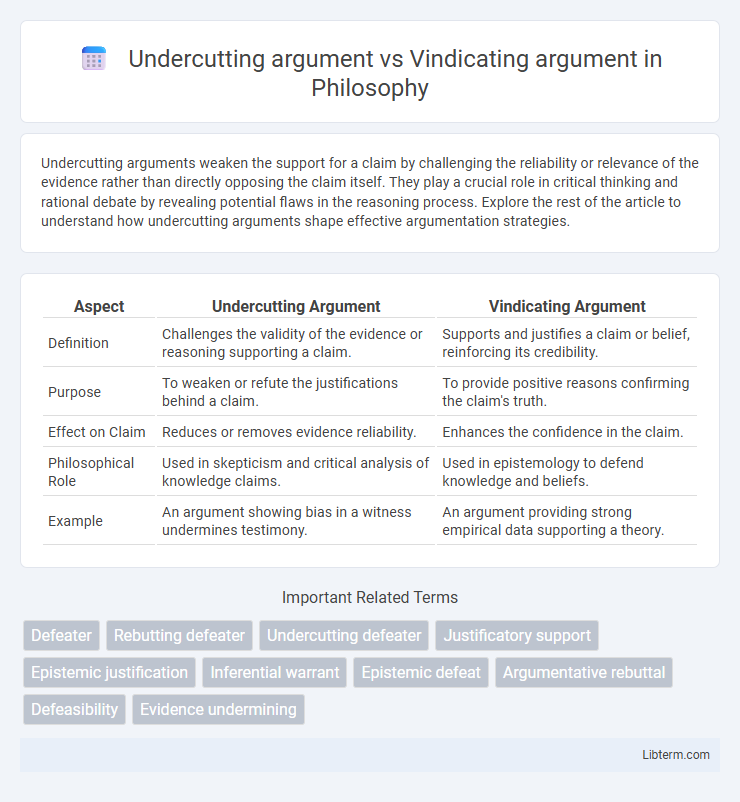Undercutting arguments weaken the support for a claim by challenging the reliability or relevance of the evidence rather than directly opposing the claim itself. They play a crucial role in critical thinking and rational debate by revealing potential flaws in the reasoning process. Explore the rest of the article to understand how undercutting arguments shape effective argumentation strategies.
Table of Comparison
| Aspect | Undercutting Argument | Vindicating Argument |
|---|---|---|
| Definition | Challenges the validity of the evidence or reasoning supporting a claim. | Supports and justifies a claim or belief, reinforcing its credibility. |
| Purpose | To weaken or refute the justifications behind a claim. | To provide positive reasons confirming the claim's truth. |
| Effect on Claim | Reduces or removes evidence reliability. | Enhances the confidence in the claim. |
| Philosophical Role | Used in skepticism and critical analysis of knowledge claims. | Used in epistemology to defend knowledge and beliefs. |
| Example | An argument showing bias in a witness undermines testimony. | An argument providing strong empirical data supporting a theory. |
Introduction to Undercutting and Vindicating Arguments
Undercutting arguments challenge the connection between evidence and a claim by questioning the reliability or relevance of the supporting evidence, thereby weakening the argument without directly disproving the claim itself. Vindicating arguments, in contrast, aim to reinforce or justify a claim by providing additional support or clarifying the validity of the evidence, strengthening the overall position. Understanding these distinctions is crucial for analyzing the structure and effectiveness of philosophical and logical reasoning.
Defining Undercutting Arguments
Undercutting arguments challenge the justification of a belief by questioning the reliability or credibility of the evidence supporting it, rather than directly opposing the belief's truth. These arguments target the connection between the evidence and the conclusion, weakening the justification without denying the conclusion itself. In epistemology, undercutting defeat plays a critical role in assessing whether evidence sufficiently supports a claim, differentiating it from vindicating arguments that bolster or confirm justification.
Defining Vindicating Arguments
Vindicating arguments aim to support or justify the reliability and credibility of a belief or theory by providing positive evidence or reasons. They strengthen the epistemic status of a claim, affirming its truth or validity rather than merely challenging opposing views. Unlike undercutting arguments that focus on weakening counterarguments, vindicating arguments bolster the original position through corroborative support or coherence with established knowledge.
Key Differences Between Undercutting and Vindicating Arguments
Undercutting arguments challenge the justificatory support of a belief by attacking the connection between evidence and conclusion, whereas vindicating arguments reinforce that connection by providing positive reasons or additional evidence. The key difference lies in their function: undercutting arguments aim to weaken or refute justification, while vindicating arguments seek to preserve or strengthen it. Understanding these distinctions is crucial in epistemology for evaluating the stability and credibility of knowledge claims.
Logical Structure of Undercutting Arguments
Undercutting arguments challenge the justificatory link between evidence and a conclusion without directly opposing the conclusion itself, often by attacking the reliability or relevance of the evidence. Their logical structure typically involves presenting a defeater that questions the epistemic support, thereby undercutting the inference that the evidence provides for the conclusion. This contrasts with vindicating arguments, which aim to strengthen or confirm the evidence-conclusion relationship through additional supporting premises.
Logical Structure of Vindicating Arguments
Vindicating arguments possess a logical structure that aims to justify and reinforce the reliability of a belief by providing positive support through evidence or reasoning. Unlike undercutting arguments, which challenge the connection between evidence and conclusion by attacking the inferential link, vindicating arguments strengthen the epistemic foundation by confirming the trustworthiness of the premises or the method of inference. This structure often involves demonstrating the coherence, consistency, or evidential adequacy that secures the conclusion's credibility within a rational framework.
Common Examples in Philosophy and Everyday Reasoning
Undercutting arguments challenge the connection between evidence and a conclusion without denying the evidence itself, commonly seen in philosophical skepticism where new findings question the reliability of previous proof. Vindicating arguments bolster the trustworthiness of evidence or reasoning, as witnessed in everyday contexts like eyewitness testimony being supported by corroborating accounts or technology validating scientific results. Examples include the Gettier problem in philosophy, which uses undercutting to question justified true belief, and legal defenses that vindicate a defendant's reliability through alibi verification.
The Role of Evidence and Justification
Undercutting arguments challenge the connection between evidence and a claim by questioning the reliability or relevance of the evidence itself, thereby weakening the justification for belief. Vindicating arguments, on the other hand, support the claim by strengthening the evidential basis or demonstrating the soundness of the inference, enhancing justification. The role of evidence in undercutting arguments is to identify flaws or exceptions, whereas in vindicating arguments, it serves to confirm and bolster the justification for a conclusion.
Implications for Critical Thinking and Debate
Undercutting arguments scrutinize the reliability of evidence or reasoning processes, undermining the justificatory basis of a claim and encouraging deeper analysis of assumptions in critical thinking. Vindicating arguments bolster the credibility and validity of claims by reinforcing supporting evidence or reasoning, promoting confidence in conclusions during debates. Understanding the interplay between undercutting and vindicating arguments enhances the ability to evaluate competing viewpoints, improving argumentation skills and fostering more rigorous, reflective discourse.
Conclusion: Choosing the Right Argumentative Strategy
Undercutting arguments target the reliability of the evidence supporting a claim, while vindicating arguments reinforce the grounds for accepting the claim as true. Selecting the right argumentative strategy depends on whether the goal is to challenge an opponent's justification or to strengthen one's own justification. Effective argumentation requires analyzing the context and determining if dismantling the foundation or bolstering the conclusion best advances the discussion.
Undercutting argument Infographic

 libterm.com
libterm.com